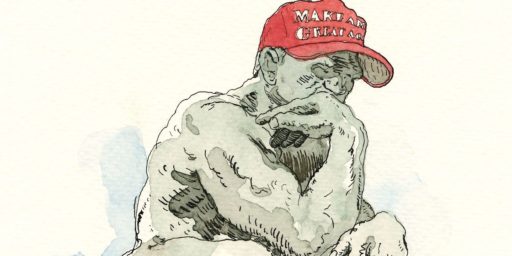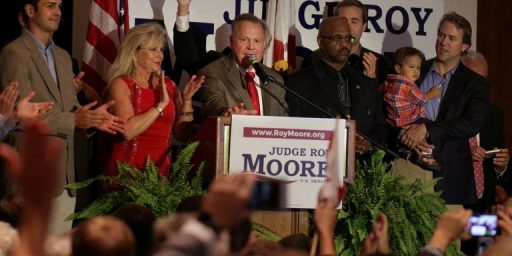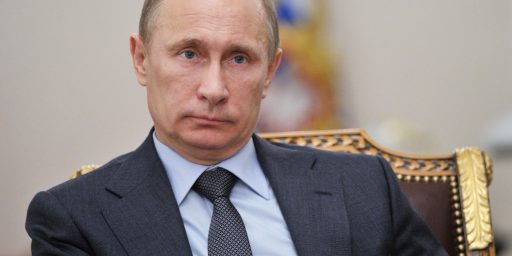DANGEROUS GAME
Victor Davis Hanson thinks we need a cultural overhaul at the State Department:
Because our diplomatic experts so often graduated from our elite universities, they believed that before shooting back it was always wise to examine the social and economic conditions — read Western exploitation — that might have encouraged such anti-American behavior in the first place. Moreover, we usually were willing to implore our clients to let us spend billons of dollars on them and risk in their defense thousands of American lives.
We routinely would worry about riling the world in order to put troops in harm’s way to protect nations that were privately relieved and publicly hostile. Those voices that urged that it was wiser for America — given the nature of man — to be a little unpredictable, perhaps even volatile at times, and, like the Greeks of old, to punish enemies and help friends, were caricatured as Rambos and simpletons who did not understand the complexities of diplomacy, a supposedly higher art than the rules of the factory, farm, or neighborhood corner.
Unfortunately, the world soon caught on to us predictable and unimaginative Americans and mastered this strange game far better than we ever did.
He then details how both enemies and erstwhile allies have taken advantage of our reluctance to be perceived as a superpowered bully.
Hanson believes that the Bush team has changed this, presumably forever:
Unfortunately, two strange events transpired that should not have, undoing all the old rules. On September 11, 2001, 3,000 Americans were murdered en masse at a time of peace — in our planes, in our most iconic buildings, and at the center of American military power. And worse still for terrorists, faux-allies, and triangulators, our president was a Texan inexperienced with the game’s nuances — not a liberal Democrat who wanted to be liked abroad or a seasoned Republican congressional alumnus who wanted to preserve the old rules. Stranger still, President Bush surrounded himself with a different kind of person — the kind who, in a crisis, offers one reason why we should act, rather than 1,000 excuses why we should not.
And so, all bets are off. Bases, alliances, institutions, friendships, immigration policy, easily duped Americans — nothing can be taken for granted anymore.
The board has been abruptly wiped clean. The game’s up.
While I find the historical analysis to be interesting, I’m not sold on Hanson’s predictions. For one thing, bureaucracies are famously resistant to change. The State Department regulars hold the short-timers that staff any Administration in contempt; this is much more true when the Republicans are in charge. (See this post for an example.) Furthermore, I’m not sure that the Bush Administration has really changed things that much. The president allowed Colin Powell and company hijack the Iraq War process, sending us hat in hand to the United Nations only to both embarrass us and embroil us in the WMD inspections regime controversy.






Heh. Well, there goes that fundamental disagreement again:
We did exactly the right thing to go to the UN. The notion that the American people were sold on those WMD arguments is wrong on the face of it; the American people were sold on the war before we went to the UN, based on numerous reasons that the administdration gave at the time–and I vividly remember all the Bush critics at the time claiming that all the OTHER reasons were “lies” and bitterly complaining that the administration’s arguments “kept shifting.” As if every different reason given was somehow proof of the administration constantly changing its arguments, rather than simply different arguments being raised in different contexts, which is a more fair analysis.
The congressional debate examined things like human rights, spreading democracy, vaguely-stated but widely understood “strategic interests,” ties to terrorist groups, attacks on American forces in the No-Fly Zones, violation of surrender terms, and so on. The final congressional resolution authorizing force contained all that and more, in addition to the WMDs.
Then, the administration went to the UN specifically on the advice of allies like Tony Blair, as well as some members of the administration, who argued that if we went to the UN we would be in a stronger position–that we would, in fact, gain valuable time for a buildup, while also gaining allies. Specifically, they even said that if we went to the UN and failed to get what we wanted, we would still get more support and more allies than if we didn’t at least make the effort.
They were vindicated on all that, and it strikes me as foolish that some now wish to spread the silly notion that America was “fooled” into a “war over WMDs,” which is simply false to the historical record, or that going to the UN was a “mistake” when, in fact, it did get us more allies and more support than if we hadn’t gone at all. It also helped valuable allies like Tony Blair–or at least he was convinced it was, which is why he asked us for it.
It strikes me that one has to have a considerable case of amnesia to claim what the critics are claiming now.